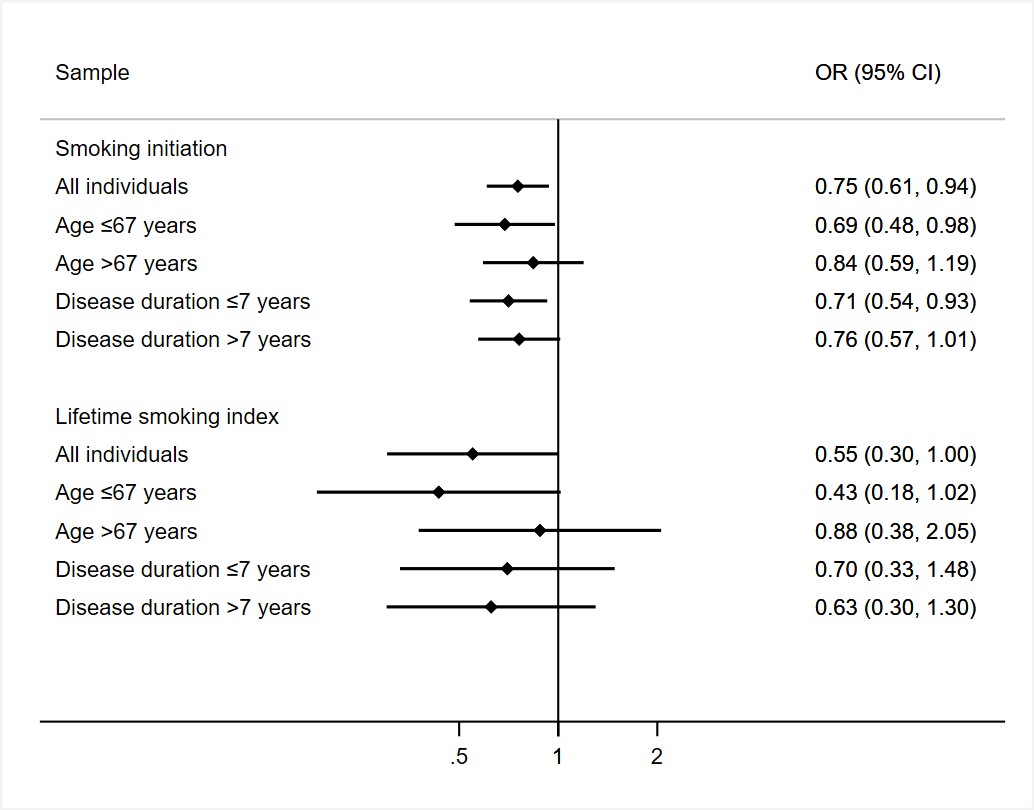Category: Epidemiology
Objective: To determine whether the association between cigarette smoking and Parkinson disease (PD) is causal using 2-sample Mendelian randomization (MR) and to examine the potential for survival and incidence-prevalence (IP) bias.
Background: Epidemiologic studies show that smoking is associated with reduced PD risk. PD has a long prodromal phase and this association may be explained by reverse causation. MR uses genetic variants associated with an exposure to estimate its causal association with a disease. Unlike epidemiologic studies, MR analyses are not biased by confounding or reverse causation, but survival or IP biases can distort MR estimates. A recent MR study based on data from the iPDGC consortium showed a trend towards an inverse association between ever-smoking and PD. However, this study did not examine whether findings were influenced by survival or IP bias.
Method: We used publicly available summary statistics to estimate the association of genetic polymorphisms with smoking initiation (191 SNPs) [1] and a lifetime smoking index (LFI, 119 SNPs), [2] and from the Courage-PD consortium (7369 PD cases and 7018 controls of European ancestry) to estimate the association of these variants with PD. We used the inverse-variance weighted method to compute odds ratios (OR) of PD per genetically-predicted increase in exposures and 95% confidence intervals (CI). Alternative methods were used in sensitivity analyses. We conducted analyses stratified by median age at study (67y) and disease duration (7y) to examine the potential for survival or IP bias.
Results: We found a significant inverse association of smoking initiation (OR per 1-SD of prevalence of ever smoking=0.75, 95%CI=0.61-0.94, p=0.011) and the LFI (OR per 1 unit=0.54, 95%CI=0.32-0.93, p=0.029, after exclusion of 2 outliers identified by MR-PRESSO) with PD. The weighted median and mode methods yielded similar associations and no directional pleiotropy was detected. In stratified analyses, significant associations were observed for smoking initiation in younger participants (OR=0.69, 95%CI=0.48-0.98, p=0.037) and cases with shorter disease duration (OR=0.71, 95%CI=0.54-0.93, p=0.012) [figure1].
Conclusion: The inverse association between smoking and PD is likely to be causal and not explained by reverse causation, confounding, and survival or IP bias.
References: 1. Liu M, Jiang Y, Wedow R, Li Y, Brazel DM, Chen F, et al. Association studies of up to 1.2 million individuals yield new insights into the genetic etiology of tobacco and alcohol use. Nat Genet. 2019;51(2):237-44. 2. Wootton RE, Richmond RC, Stuijfzand BG, Lawn RB, Sallis HM, Taylor GMJ, et al. Evidence for causal effects of lifetime smoking on risk for depression and schizophrenia: a Mendelian randomisation study. Psychol Med. 2019;50(14):2435-43.
To cite this abstract in AMA style:
C. Domenighetti, PE. Sugier, A. Ashokkumar Sreelatha, C. Schulte, S. Grover, O. Mohamed, B. Portugal, P. May, D. Bobbili, M. Radivojkov-Blagojevic, P. Lichtner, R. Krüger, T. Gasser, M. Sharma, A. Elbaz. Is the association between cigarette smoking and Parkinson disease causal? A Mendelian Randomization study. [abstract]. Mov Disord. 2021; 36 (suppl 1). https://www.mdsabstracts.org/abstract/is-the-association-between-cigarette-smoking-and-parkinson-disease-causal-a-mendelian-randomization-study/. Accessed December 28, 2025.« Back to MDS Virtual Congress 2021
MDS Abstracts - https://www.mdsabstracts.org/abstract/is-the-association-between-cigarette-smoking-and-parkinson-disease-causal-a-mendelian-randomization-study/

